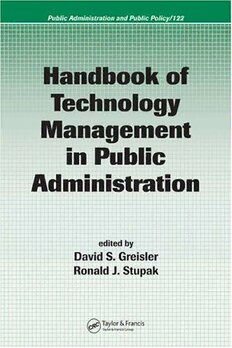
Handbook of Technology Management in Public Administration (Public Administration and Public Policy) PDF
877 Pages·2006·13.093 MB·English
Most books are stored in the elastic cloud where traffic is expensive. For this reason, we have a limit on daily download.
Preview Handbook of Technology Management in Public Administration (Public Administration and Public Policy)
Description:
All organizations, whether for profit, not for profit, or government, face issues of information technology management. While the concerns involved may differ from organization to organization, the principles of good information technology management remain the same.Using a compilation of articles on various topics relating to technology management, Handbook of Technology Management in Public Administration addresses the management, implementation, and integration of technology across a wide variety of disciplines. The book highlights lessons learned to assist you in solving contemporary problems and avoiding pitfalls. It discusses the creation of innovative paradigms, new boundaries, diversity frameworks, and operational breakthroughs emanating from technology. It also raises questions about the productivity, violence, and intrusions of technology into the personal, organizational, and social environments as we move forward. This book identifies the potential ethical, legal, and social implications of technology from electronic signatures to genetic screenings to privacy interventions to industrial applications. It raises issues, problems, and concerns arising from technology and its effects on nurturing or nullifying the foundations of life and liberty in a constitutional democracy. With the development of new tools and techniques, technology promises to make organizations more productive and efficient. Handbook of Technology Management in Public Administration identifies effective technology management approaches while balancing the repercussions of technological growth.
See more
The list of books you might like
Most books are stored in the elastic cloud where traffic is expensive. For this reason, we have a limit on daily download.
